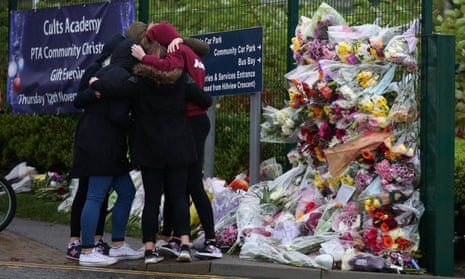The fatal stabbing of a teenager at Aberdeen’s Cults academy, in an area of the city not known for gang violence or knife crime, has inevitably led to suggestions that school security should be tightened.
At a press conference in the city, Ch Supt Adrian Watson was calmly adamant that Police Scotland did not want to react prematurely by, for example, introducing knife detection equipment in schools.
“If you look at the record in schools not only across the city but across the nation, these incidents are few and far between,” he said. “An extraordinary incident occurred ... and we have to be sensible and realistic moving forward. Of course we can always do more, but it’s a very safe environment at Cults and across the education authority.”
As Watson moved to reassure the public in Aberdeen, in Glasgow the supporters of Strathclyde’s groundbreaking Violence Reduction Unit (VRU) were celebrating its 10th anniversary on Thursday evening.
The tragedy of Bailey Gwynne takes place against a backdrop of Scotland’s persistent problem with knife-related violence, and the country’s continuing, often innovative and occasionally repressive attempts to tackle it.
The VRU was set up in 2005 to tackle Glasgow’s deeply rooted knife and gang crime. Seventy-five years on from the publication of the novel No Mean City – which charted the extremities of Glasgow’s Gorbals gangland and its Razor King, Johnnie Stark – blade culture remained endemic.
At the time, a person was more than three times more likely to die from a stab wound in Scotland than in England and Wales, and Glasgow had three and a half times more knife-based homicides than anywhere in Europe.
“People saying we need metal detectors in schools is understandable but it’s not useful,” the VRU’s co-founder, former Det Ch Supt John Carnochan, said before the celebrations.
All knife crime rates have been dramatically reduced over the decade – by 2012, assaults involving a knife had fallen by one-third and there had been a 41% drop in the number of people of all ages found with a knife – thanks in main part to the pioneering work of the VRU.
Adapting anti-gang violence initiatives first used in Boston in the US in the 1990s, the unit also lobbied successfully for increases in maximum sentences for carrying knives.
But as Carnochan pointed out, more than half of all murders in Scotland still involve a sharp implement.
“We tackled purchasing, we tackling carrying it on the street but there’s one in the kitchen drawer in every home too,” he said. “The thing with knives is that most often a young person will say: ‘I didnae mean him to die.’ A young person doens’t know that the chances of dying if you are stabbed in the upper torso is huge. Nor should they.”
The Cults academy tragedy occurred just as Police Scotland was facing a ban on using stop and search without legal cause. The force’s policy faced fierce criticism, particularly in relation to young people, after it emerged that hundreds of children and thousands of teenagers had been routinely searched without any evidence of wrongdoing.
There are ongoing concerns that the force may use a loophole regarding searching children for possession of alcohol to continue their much-criticised approach.
For Carnochan, there already exists a far better way for officers to engage with young people. Originally piloted in Aberdeen, “campus cops” are already peppered across the country but the scheme faced funding cuts a few years ago.
“The idea of campus officers, who are there every day with the most vulnerable groups, is very important. The idea is not to police, to school or sort out bad behaviour, but to deal with the drama before it becomes a crisis.
“For the police it’s a way for them to relate to and engage with kids in an environment that’s not about them stopping and searching them or moving them on from street corners. Police Scotland needs to be considering that as part of their ongoing school business.”








